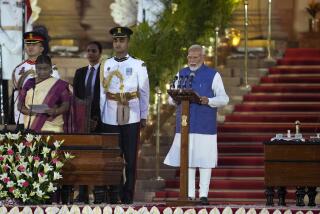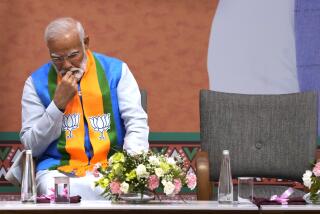India Prime Minister Loses Vote, Resigns; Bitter Rival May Be Successor : Asia: Singh survives just 11 months as head of a shaky coalition. His defeat in Parliament is more devastating than expected.
- Share via
NEW DELHI — Indian Prime Minister Vishwanath Pratap Singh fell from power Wednesday after a crushing parliamentary defeat, paving the way for a government headed by one of Singh’s most bitter rivals and backed by his former enemies in India’s long-ruling Congress-I party.
Singh, a 59-year-old socialist, survived just 11 months as the head of a shaky coalition amid rapid economic decay and widespread religious violence. He submitted his letter of resignation to Indian President Ramaswami Venkataraman just before midnight as his final official act.
The Indian president is likely to name Chandra Shekhar, Singh’s fellow Janata Dal (People’s Party) member, as the next prime minister today or Friday, senior party officials said.
It had been expected that Singh would lose Wednesday’s crucial parliamentary vote of confidence after a key coalition party withdrew its support and his own party split behind the rival leaders. But his defeat was more devastating and personal than anticipated.
His loss came after a marathon session of the Indian Parliament, which the prime minister had billed as “a debate before the nation” on the two most critical issues it has faced in decades: A move by Hindu fundamentalists to tear down a 16th-Century mosque and replace it with a temple to the Hindu god Rama, and Singh’s affirmative-action plan to reserve government jobs for low-caste Hindus, which has set off a wave of high-caste suicide protests.
“I am placing a mirror before you so everyone can see your face,” Singh declared Wednesday in his opening speech to Parliament. “We have to decide these issues once and for all. . . . The question is, what kind of country do we want? Do we want a country where there is love, or one where there is hate?”
But when the debate ended nearly 11 hours later, Singh was left isolated and exhausted from vicious verbal assaults, even by his own party members, and portrayed by his worst enemies as a “hypocrite,” a “liar” and “a total failure.”
When the final confidence vote was taken on whether Singh should continue in office, only 142 of Parliament’s 542 voting members cast ballots for him, the rest having voted against him, abstained or failed to attend.
Analysts said it was the first time in Indian history that a government was brought down on the floor of Parliament, and it ended the nation’s second-shortest regime ever, a contradictory coalition led by a man who once said that he should never serve as prime minister.
“The debate has been the greatest thing that could have happened to us,” said M. J. Akbar, an author and member of Parliament from former Prime Minister Rajiv Gandhi’s Congress-I party. “If we had thought out a scenario for our interests, I don’t think we could have done better.
“Now today, everyone in India knows where (Singh) really stands and where he has failed.”
Gandhi, whose bitter defeat during the elections a year ago brought Singh’s coalition to power, already has committed his party to supporting Shekhar as Singh’s successor.
The Congress-I still controls 195 seats in Parliament, making it the largest single minority party. But Gandhi has said he will decline any offer to attempt to form the next government himself, preferring instead to play kingmaker to Shekhar.
Independent analysts have likened Gandhi’s move to that of his mother, Indira Gandhi, who engineered the fall of India’s only other non-Congress government in 1979. Indira Gandhi backed a weak leader, Charan Singh, who soon fell when she withdrew her support and forced new elections that brought her back into office in a landslide victory.
“History will repeat itself with a vengeance,” Finance Minister Madhu Dandavate, a Janata Dal leader and veteran of the 1979 debacle, predicted in one of the few speeches Wednesday supporting Singh.
Dandavate and the handful of senior party leaders who remained loyal to Singh until the end echoed the prime minister in picturing Wednesday’s vote as a test of India’s claim to be a secular home for all religions.
The political crisis that forced Wednesday’s confidence vote came only after Singh used the power of the state to forcibly stop Hindu fundamentalists from destroying the disputed mosque in Ayodhya on Oct. 30. His move provoked a Hindu revivalist party that was Singh’s key to power to withdraw its support.
“We had to take a decision on whether we should be guided by power or principles,” Singh told Parliament in justifying a crackdown that left dozens of militant Hindu pilgrims dead at the mosque and triggered Hindu-Muslim clashes nationwide that killed at least 250 more.
“Whenever it is said that my religious faith or anyone’s religious faith is above the constitution and above the law, that is the basis of a theocratic state,” he added.
But Singh’s strategy to cast the debate as one of secularism vs. fundamentalism quickly backfired.
L. K. Advani, the leader of the Hindu revivalist Indian People’s Party that turned on Singh after Advani was arrested en route to the mosque, delivered a scathing attack on the prime minister. He alleged that Singh had given him his word that he would permit destruction of the mosque and construction of a Hindu temple at the site.
And Rajiv Gandhi, staring at Singh, declared: “You now stand exposed, naked in front of the nation.”
Gandhi, who has served as India’s main opposition leader since his defeat by Singh, stressed that Singh has managed to survive in office only through the support of the same fundamentalists he now opposes.
“Suddenly, one week ago, the prime minister found secularism,” Gandhi continued wryly. “Nobody will believe you. It’s too late.”
Gandhi then launched into a bitter critique of Singh’s 11 months in office, during which armed insurgencies have grown in the Indian states of Jammu and Kashmir, Punjab and Assam, together claiming what he said were as many as 5,000 lives.
Gandhi also blamed Singh for India’s skyrocketing inflation and declining foreign exchange reserves, which are now so low the government plans to sell gold for the first time in history.
Shekhar, in his speech to Parliament, offered few concrete indications of how his government would repair the damage done by the last.
“Our country is on the verge of a storm. It is going in the wrong direction,” he said. “We may not improve it, but we will try to save it.” He made no specific proposals.
“I was waiting to hear something--some policy about something,” said Indrajit Gupta, the leader of one of several Communist parties that continued to support Singh.
“The only assurance we got from Mr. Chandra Shekhar himself is that he would be willing to play the role of some sort of mediator. . . . But how? Well, I wish him well, and good luck.”
More to Read
Sign up for Essential California
The most important California stories and recommendations in your inbox every morning.
You may occasionally receive promotional content from the Los Angeles Times.










